
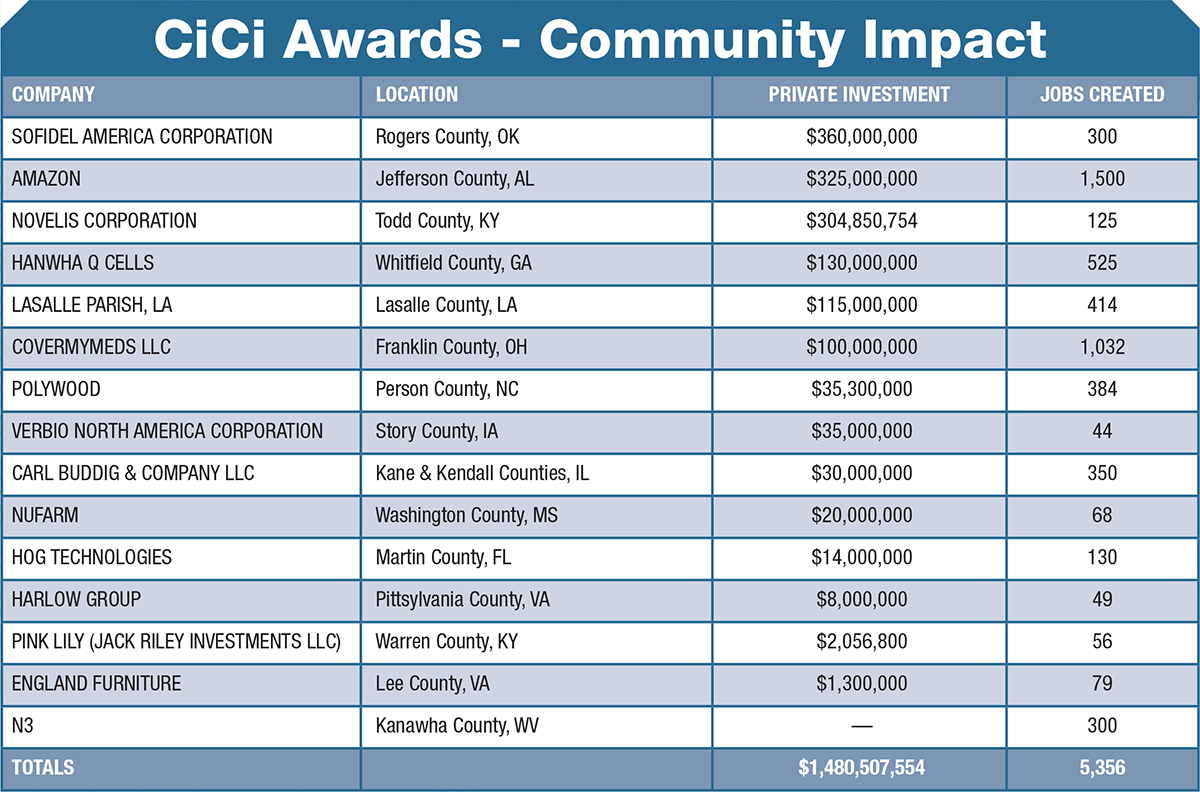 A company’s decision to locate a new facility or to expand an existing one can have a profound effect on a community, and it can go well beyond being just a business decision. For the 14th annual CiCi Awards for Community Impact, Trade & Industry Development is recognizing 15 projects announced in 2018 that demonstrate how site selection can make a difference in the community where the company has chosen to locate.
A company’s decision to locate a new facility or to expand an existing one can have a profound effect on a community, and it can go well beyond being just a business decision. For the 14th annual CiCi Awards for Community Impact, Trade & Industry Development is recognizing 15 projects announced in 2018 that demonstrate how site selection can make a difference in the community where the company has chosen to locate.
The collective capital investment of our 15 winning projects totals just under $1.5 billion, creating 5,356 new jobs. But the stories go well beyond the numbers. In many cases, the jobs created and the revenues generated are helping to stabilize a community that is sorely in need of employment for its residents. Also, success breeds success—many community leaders mentioned how the addition or expansion of a business will help to attract other similar businesses and even more investment.
Many of these honorees are helping to bring jobs to areas that have been hurting. For instance, in Urania, La., the LaSalle Lumber Co. is reviving an industry that’s been dormant in town since 2002 and helping to reverse a poverty rate that has neared 24 percent. Likewise, the UK-based Harlow Group is locating its first U.S. precision sheet-metal fabrication plant in Danville, Va.—an area where the poverty rate was more than 23 percent, with unemployment at 6 percent. England Furniture in Lee County, Va., and Carl Buddig and Company in Illinois are also bringing employment back to areas that have lost jobs in recent years.
Other projects are keys to providing and enhancing education, including the new $325 million Amazon logistics facility in Bessemer, Ala., which will create a tuition assistance program. Novelis Corp., the world’s largest recycler of aluminum, has already made huge impacts in the communities around Elkton, Ky., by contributing to local nonprofits, schools and other organizations, in addition to working with schools and colleges to establish training programs. The health-care company CoverMyMeds is committed to continuing philanthropic investments and employee engagement in the Columbus, Ohio, region through local organizations, include partnerships with the Center of Science and Industry and the Columbus Metropolitan Library. And in Roxboro, N.C., Polywood will be making outdoor furniture from recycled plastics, and is in the process of putting in a full recycling center for the town that the company will fund and help manage—in addition to working with surrounding counties and even North Carolina itself for recycling centers statewide.
These are just a few of the inspirational stories behind our 2019 CiCi Community Impact winners. None of these projects, of course, would have been possible without the hard work of community leaders, local and state development entities and economic developers, along with the visionaries at the companies themselves. Read more about how the transformation of a company’s location can make a huge difference in their communities.
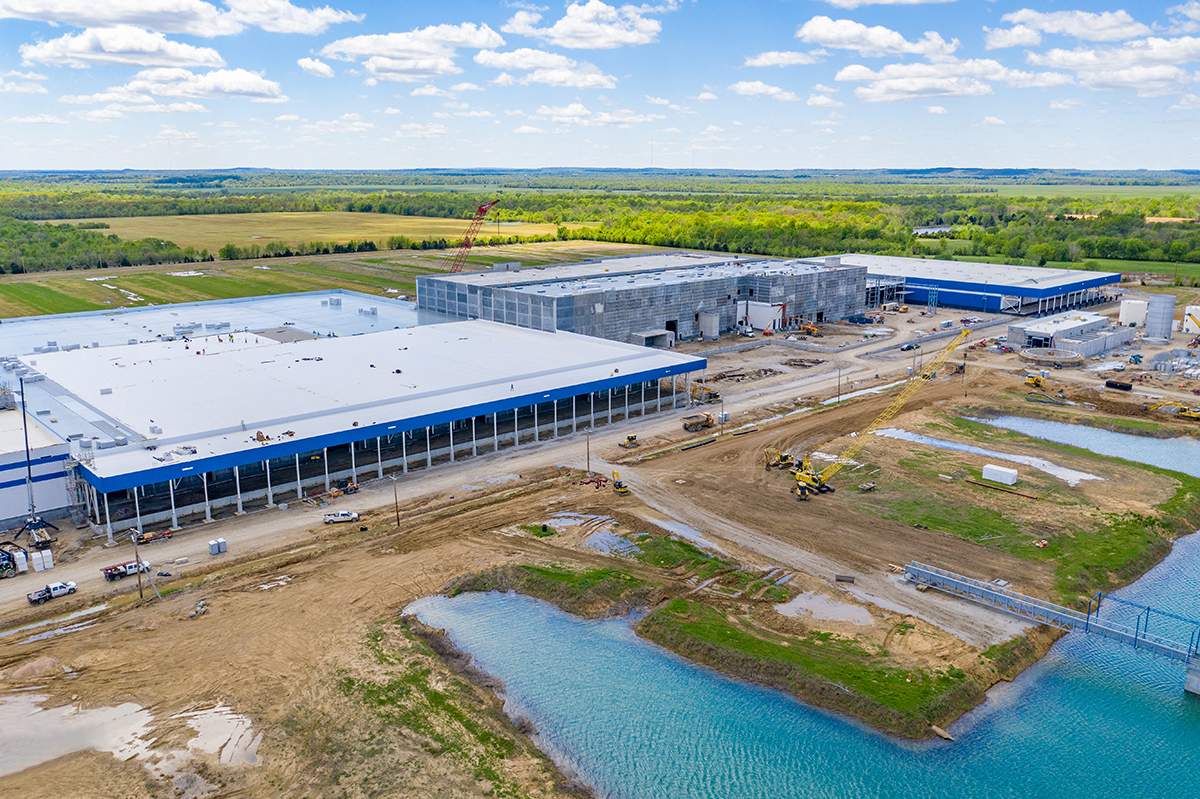
Rogers County, Oklahoma
For decades, the intended site of the Black Fox Nuclear Power Plant in Inola, Okla., has sat primarily vacant, except for a few ranchers who let their cattle graze on the land. The nuclear plant was announced in 1973, but then cancelled in 1982 after public pushback following the incident at Three Mile Island.
In 2017, the Inola Area Chamber of Commerce voted to rezone the property from agricultural to industrial, opening it up for development—and for a use that is now benefiting the Rogers County region, including creating hundreds of jobs.
Sofidel America Corp. was looking for a site to manufacture sanitary paper products for consumers. They wanted 160 acres, and the facility needed to be near a raw water supply in Northeastern Oklahoma. The company also wanted it to be near its current facility in Tulsa. The Black Fox nuclear site in Inola fit all those requirements.
With a private investment commitment of $360 million, Sofidel will install facilities for two tissue paper machines, for an overall production capacity topping 120,000 metric tons per year—and employing 300 full-time workers. When construction is complete in mid-2020, the two production lines will be mainly dedicated to producing toilet tissue and towels. Sofidel’s total manufacturing space in the region will be about 2 million square feet.
Coordinated by Tulsa’s Future, a Chamber-led regional economic development plan supported by public and private investors, the project involved more partner entities than any in the plan’s 12-year history. Among the groups taking part were the state Department of Commerce, Tulsa Regional Chamber, Cherokee Nation, Public Service Company of Oklahoma, ONE Gas, Rogers County, the Oklahoma Department of Transportation and the City of Inola.
“Sofidel is going to have a huge impact on Inola and Rogers County, the Inola school system and Northeast Tech [technical college] and will eventually create significant benefit through new tax revenues,” said Inola Mayor Larry Grigg. “We are excited about the positive impact this will bring to the area.”
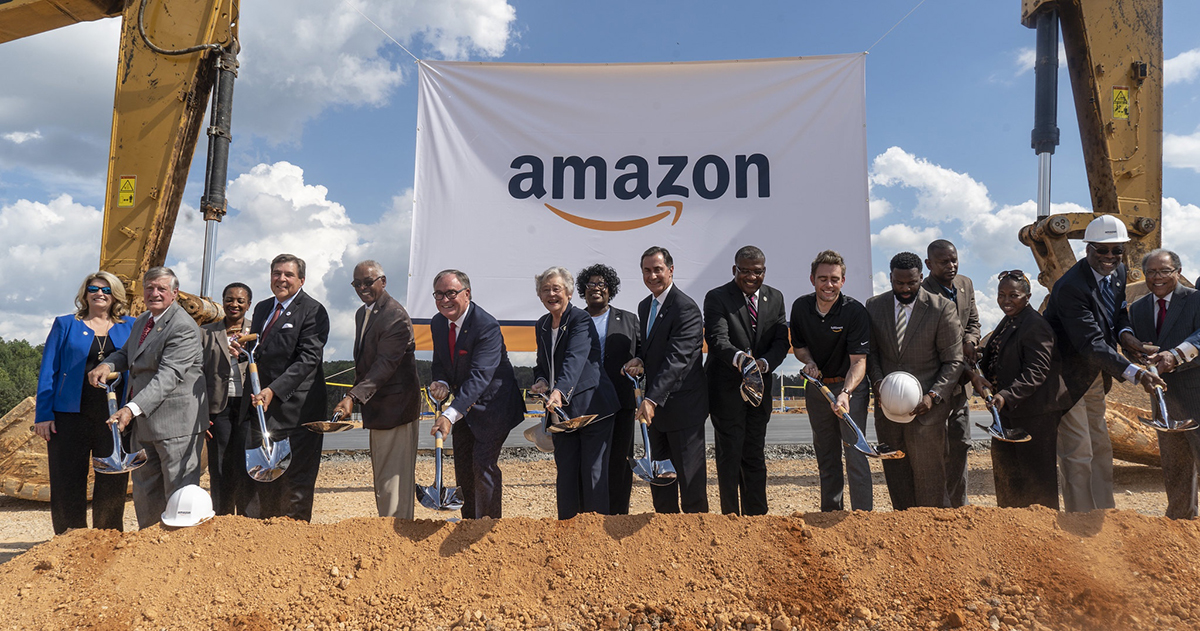
Jefferson County, Alabama
The Birmingham area’s longshot bid for Amazon’s second North American headquarters may not have landed the grand prize, but the city’s “Bring A to B” campaign certainly played a role in a different economic development coup: the state’s first Amazon fulfillment center, with 1,500 new jobs. The Seattle-based internet retail giant is investing $325 million to bring a new 825,000-square-foot fulfillment center to Bessemer, just minutes from downtown Birmingham.
Jefferson County Commissioner David Carrington said the Bring A to B campaign served to raise the Birmingham area’s profile with the company. “I was told in my first meeting directly with Amazon that once the group reviewed our Bring A to B proposal, immediately people started googling Birmingham, and they said we need to find out more about this community.”
Amazon is seen as a powerful catalyst for growth in Bessemer, a former industrial center that was once home to large steelmaking operations. In addition to the city of Bessemer and the Jefferson County Commission, other organizations involved in wooing Amazon included the state Department of Commerce, the Birmingham Business Alliance and AIDT.
Bessemer Mayor Kenneth Gulley said the Amazon project represents the largest single private investment in the city’s 131-year history. As a bonus, the company has pledged to create a tuition-assistance program for its Bessemer workforce. “Amazon is bringing jobs and opportunity to our residents and students. I am particularly proud of the educational incentives Amazon will offer our young people: Get your high school diploma, work one year and receive $3,000 the next four years toward furthering your education,” Gulley said.
Bessemer’s prize is a state-of-the-art fulfillment center, which will be staffed with 1,500 full-time employees and is projected to deliver a significant economic impact for Jefferson County and Alabama. For starters, the annual payroll at the high-tech facility will top $46 million. Overall, the center will contribute $203 million to the county’s economic output annually, while adding $123 million to the county’s GDP, according to a study prepared by the Center for Business and Economic Research in the University of Alabama’s Culverhouse School of Business. The UA analysis says the facility will contribute $232 million to the state’s economic output each year and add $137 million to the state’s GDP.
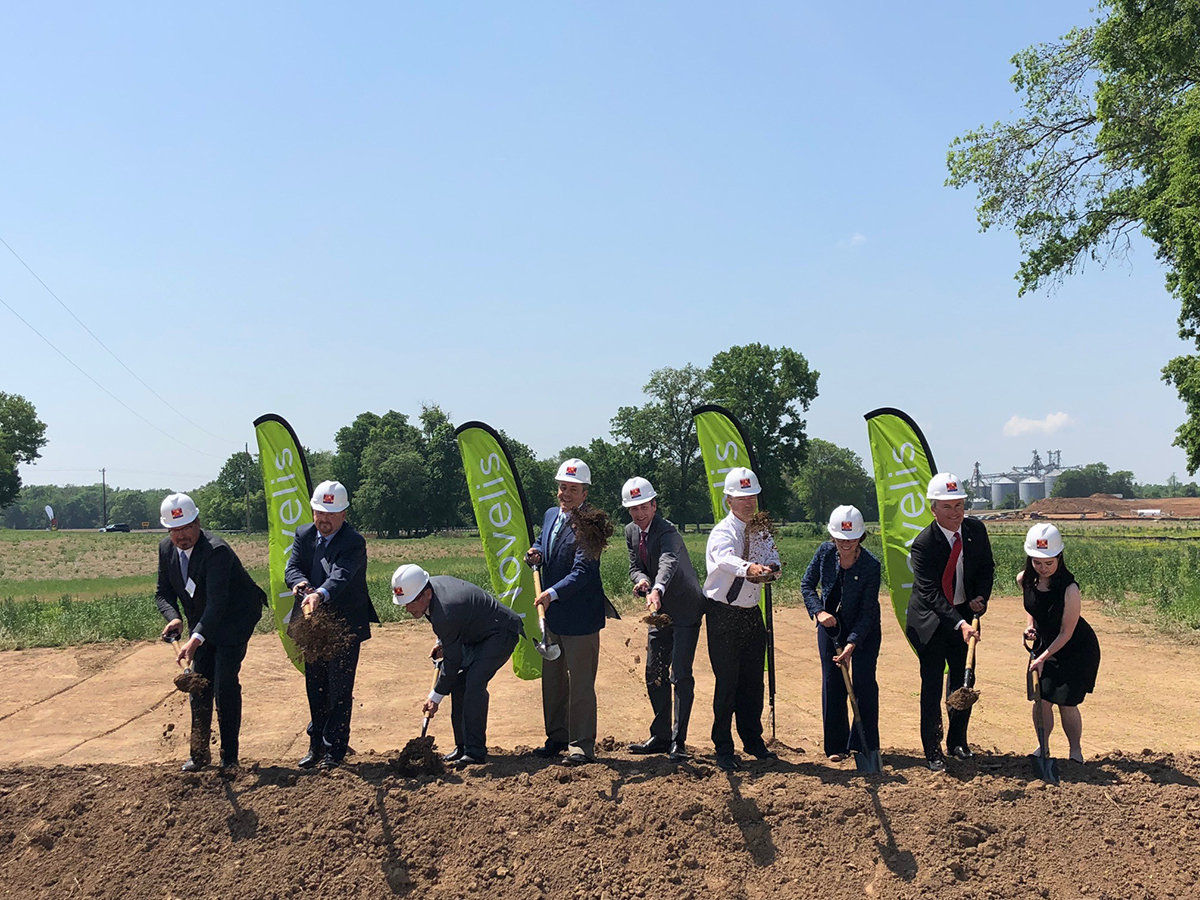
Todd County, Kentucky
Novelis Corp. is the world’s largest recycler of aluminum and a top producer of the metal, supplying many industries, but especially the automotive and beverage can sectors. In January 2018, the company announced plans to construct a 400,000-square-foot facility on a 150-acre greenfield site in Guthrie, Ky., for the heat treatment and pre-treatment of rolled aluminum coils from nearby Logan Aluminum in Russellville, which is co-owned by Novelis.
The company’s nearly $305 million investment will create 125 full-time jobs and will add to Novelis’s existing footprint of 24 advanced
rolling and recycling facilities in 10 countries. The company’s Kentucky presence currently includes a 130-employee recycling facility in Berea that is responsible for 20 percent of the nation’s recycled beverage cans.
Working with the state Economic Development Cabinet and the South Western Kentucky Economic Development Council, the new plant in Guthrie may just be the start of something much bigger—which may well impact Guthrie, Todd County and the entire region for decades. Novelis has two other potential phases to the project that, if put in motion, can add about 300 additional employees.
Scott Marshall, Guthrie’s mayor at the time of the announcement in 2018, welcomed the investment and new jobs the Novelis plant will bring. “I am both honored and excited to welcome Novelis to Guthrie,” he said. “Everyone in our community is thankful for this partnership and looking forward to the jobs and opportunities that will be provided.”
Novelis has already made huge impacts in the surrounding communities by contributing dollars to local nonprofits, such as Rotary Clubs, schools and other entities. The company also is working with the Todd County Board of Education and the Hopkinsville Community College to establish training skills that Novelis will need in its workforce. Not only is there a need for electricians, plumbers and the basic trades, the company is partnering with these other institutions on advanced manufacturing training opportunities—which will not only help the Novelis workforce, but also other industries in the region in the future.
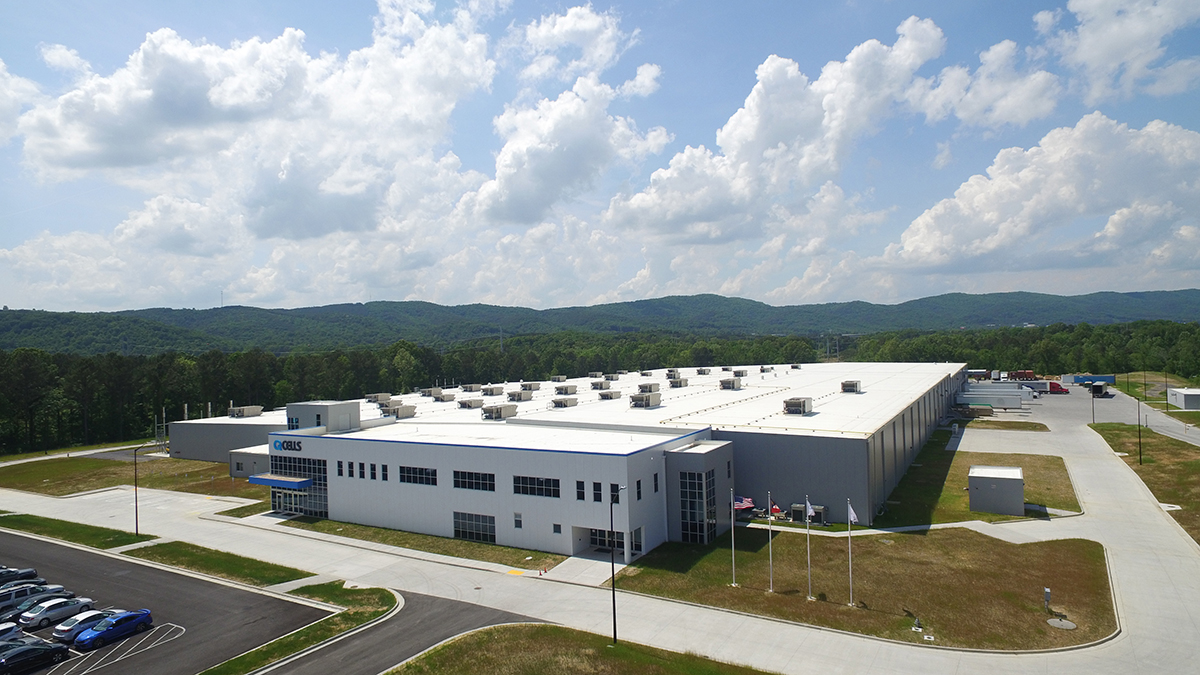
Whitfield County, Georgia
In 2011 and 2012, Whitfield County lost more jobs than any other metro region in the country. By mid-2013, the area’s unemployment rate stood at 12.3 percent, well above the nation’s overall jobless rate of 7.4 percent. As industries became more streamlined, with a leaner workforce, there seemed to no longer be a need to bring back many of those jobs.
Fast-forward six years. Hanwha Q CELLS announced it is investing $130 million over three years for a project that will bring 525 jobs to the region, significantly impacting the economy of northwest Georgia. The new 360,000-square-foot Hanwha Q CELLS facility in Dalton, Ga., will manufacture solar panels, specifically high-performance and high-quality photovoltaic modules. It will be the largest solar production facility in North America. Hanwha Q CELLS is headquartered in South Korea and currently operates manufacturing facilities in Malaysia and China.
“We are excited that an innovative company like Hanwha Q CELLS chose Whitfield County for its first U.S. manufacturing facility,” said Georgia Department of Economic Development Commissioner Pat Wilson. “This announcement puts a spotlight on Dalton and Northwest Georgia’s attractiveness as a location for international advanced manufacturing projects.”
In November, the Dalton-Whitfield County Joint Development Authority received the “Large Community Deal of the Year Award” by the Georgia Economic Developers Association for its “outstanding achievement in the location/expansion of business in Georgia” for the Hanwah Q CELLS project.
“We are excited to bring our technology leadership to Georgia in manufacturing solar modules and look forward to building long-term relationships to further expand our manufacturing base and contribute to environmentally sustainable energy solutions,” said James Choi, vice president of Hanwha Q CELLS Korea.
The project is considered critical to a region of the state that continues to recover from the recession of a decade ago. Dalton, known as the “floorcovering capital of the world,” has been seeking to recruit more diverse industries, to help the community become more recession proof. Q CELLS is now the largest non-floorcovering-related project since the recession, and in just eight months has become one of the area’s 10 largest industries.
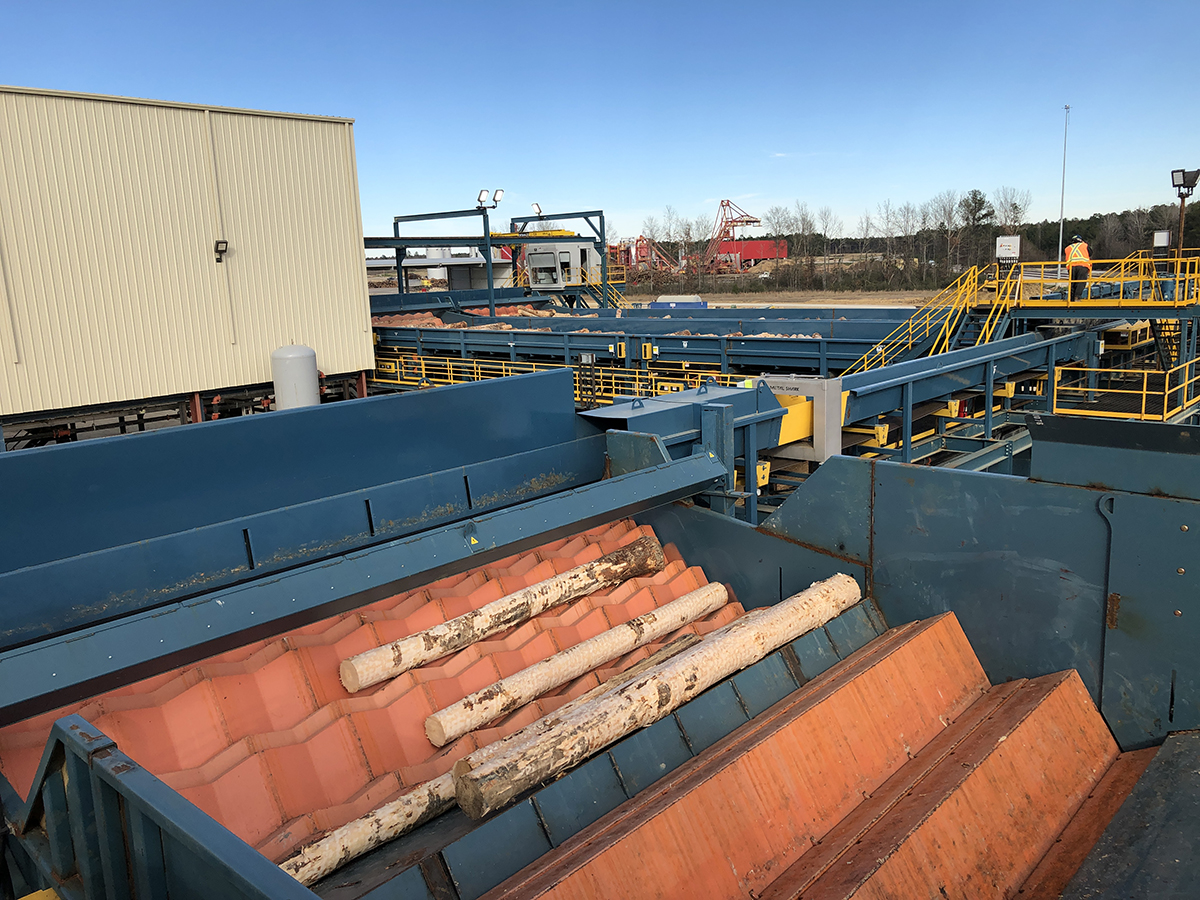
LaSalle Parish, Louisiana
With an investment of $115 million, the LaSalle Lumber Co. will build a state-of-the-art lumber mill on 125 acres in the town of Urania, located at an old sawmill site of 285 total acres—and reviving an industrial location that has remained dormant since 2002. Maybe more important, though, the new mill will revitalize the town’s storied history of lumber production.
The lumber industry has been part of Urania’s tapestry since its founding about 130 years ago. Unfortunately, with a poverty rate of nearly 24 percent, this Central Louisiana town of 1,300 residents has been struggling. Now, led by LaSalle Lumber, the resurgence of activity in this field and the 107 direct jobs created by the new sawmill (along with 150 construction jobs and an estimated 307 indirect jobs) bring much needed economic activity to the area.
“The forestry industry is what led Henry Hardtner to establish the town of Urania, so we’re very pleased to be working with Hunt Forest Products and Tolko Industries to bring LaSalle Lumber Co.—a new economic engine—to our community,” said Urania Mayor Terri Corley. Louisiana-based Hunt partnered with Canada-based Tolko, its first U.S.-based venture, on the LaSalle project, working with the town of Urania, Louisiana Economic Development (LED) and the Central Louisiana Economic Development Alliance.
The LaSalle site will produce an annual payroll of $6.7 million by 2028, and an average annual salary of more than $46,000. Over a 10-year period, LED estimates the joint project will produce more than $30 million in new state and local tax revenue. Additionally, Corley notes the new sawmill will generate revenue for Urania as a customer of its municipal water supply and wastewater treatment system.
The sawmill will produce about 200 million board-feet of lumber annually, and it will share the site with Drax Biomass’s sustainable wood pellet facility, LaSalle BioEnergy, which now occupies the other 160 acres. In addition to the new economic activity in the area, the new sawmill plans to supply residuals and wood fiber to Drax for use in manufacturing wood pellets, which are a renewable source of energy.
Together, LaSalle Lumber and Drax Biomass create a synergetic business model, as both companies will lower their carbon footprint by creating an efficient, cost-effective method to capitalize on wood residuals.
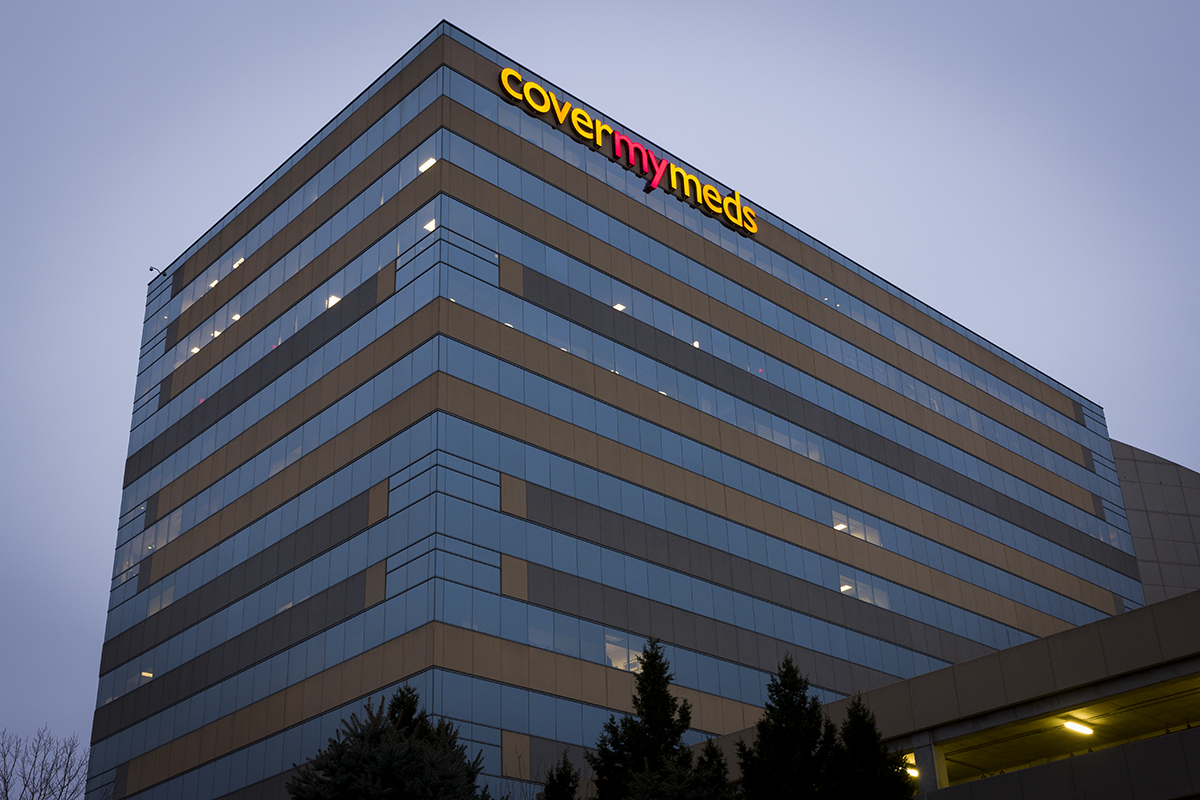
Franklin County, Ohio
CoverMyMeds is one of the fastest growing health-care technology companies in the U.S. Part of McKesson Prescription Technology Solutions, CoverMyMeds is a leader in electronic prior authorization and real-time benefit check solutions. The company helps customers avoid billions of dollars each year in administrative waste and medical spending.
Founded in 2008, the company’s continued growth required a larger campus. JobsOhio, Columbus 2020, the state of Ohio and the city of Columbus collaborated on a plan for CoverMyMeds to remain in Columbus, ultimately helping find the right urban location for the new campus—a site that would address the company’s needs and reduce costs.
The Franklinton location near downtown Columbus is undergoing a revitalization movement and appeals to companies such as CoverMyMeds, which is expected to help create a cluster of tech establishments in the future. Additionally, it provides the community with an active partner that will provide technology education and opportunity to the residents of the neighborhood.
CoverMyMeds is investing $100 million into a community that has been underutilized for more than a decade. The initial project commitment is 1,032 jobs, which nearly doubles its current workforce and allows the company to continue its mission of helping patients get the medications they need to be healthy. The campus project will also offer a comprehensive training and careers program for Columbus, including computer programming, career guidance services, mentoring, annual scholarships for students to attend technical boot camps, a co-op/apprenticeship program and more.
In addition, CoverMyMeds is committed to continuing its philanthropic investments and employee engagement in Franklinton through local organizations. The company also announced partnerships with COSI (Center of Science and Industry) and the Columbus Metropolitan Library, to enrich community resources and educational opportunities. The goal is to build programs that will create opportunities for both youth and adults.
“Our new Franklinton campus was inspired by two pillars: our continued community investment and building a remarkable workplace for our employees,” said Veronica Knuth, vice president of talent for CoverMyMeds. “Our employees feel a strong connection to this neighborhood and are excited to engage the community in unique ways.”
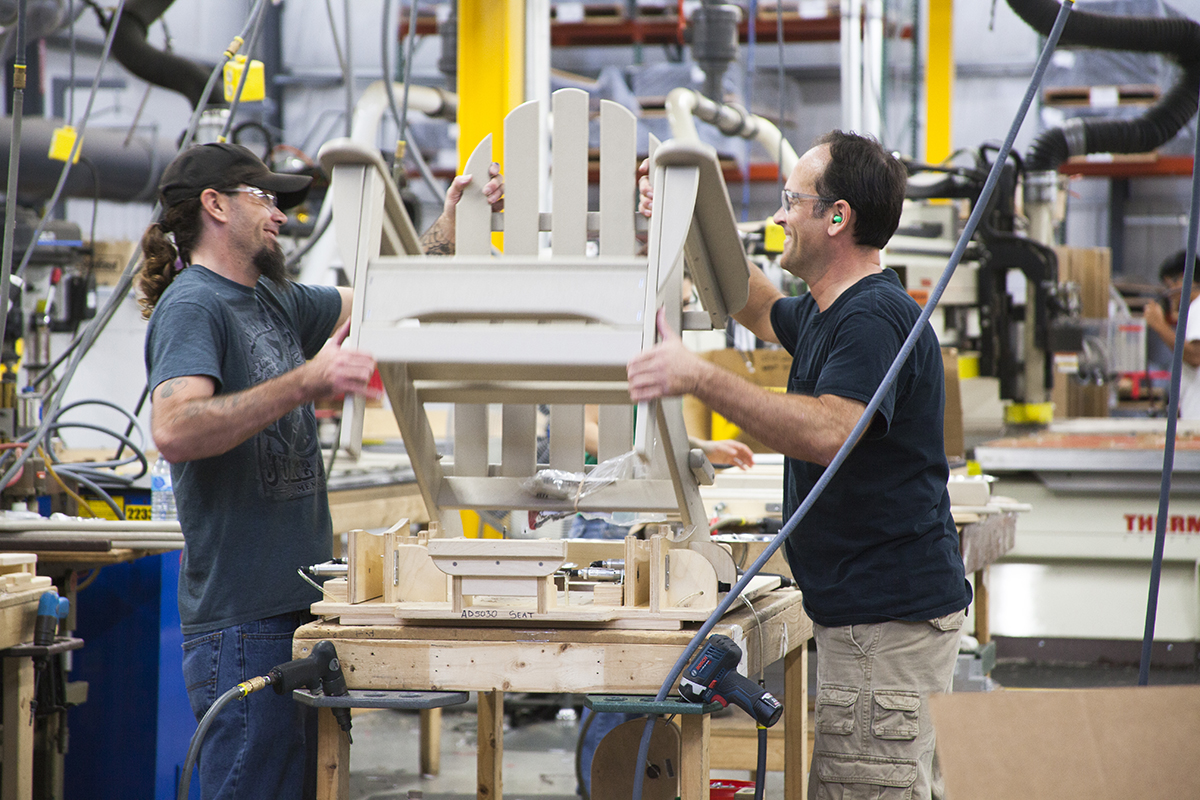
Person County, North Carolina
Polywood, a manufacturer of outdoor furniture made from recycled plastics, was founded in an Indiana garage in the 1980s by two high school friends. As the business has grown, the company looked to expand toward the Southeast U.S., to be closer to the 60 percent of its customer base.
“We looked at eight or 10 [locations],” said Dave Grider, general manager of the North Carolina facility. “But when I came to Roxboro on my second visit, I was floored with the outpouring of support from the community. Not only did that group want to know about who we are as an organization, but they wanted to know what they could do to support us.” After that meeting, Grider called the company CEO and said, “This town is it. If everything else pans out, this is where we need to be.” Working with the N.C. Department of Commerce, the Economic Development Partnership of N.C., Person County and the N.C. Community College System, among other groups, the logistics did pan out, and Polywood announced its second production and shipping facility in North Carolina in the fall of 2018.
But the impact of Polywood in Roxboro is expected to be far-reaching. It’s an economic boon to the rural community—the nearly 400 jobs that will be created are expected to pay above the county’s average salary, and in fact, the day after the announcement by Gov. Roy Cooper, more than 200 people applied to work at the facility. The company will be contributing to sustainability at the local and state levels, and beyond.
Through the decades, Polywood has remained true to its mission of stewardship and doing something meaningful for future generations. The company processes more than 400,000 milk jugs per day—all material that would have ended up in a landfill. Each furniture piece it produces is backed by a 20-year warranty and resists stains and corrosive substances.
Now, Polywood is in the process of putting in a full recycling center in Roxboro, which the company will fund and help manage. But it doesn’t stop there—the company will be working with surrounding counties on opening recycling centers and are in talks with North Carolina for possible recycling centers across the state.
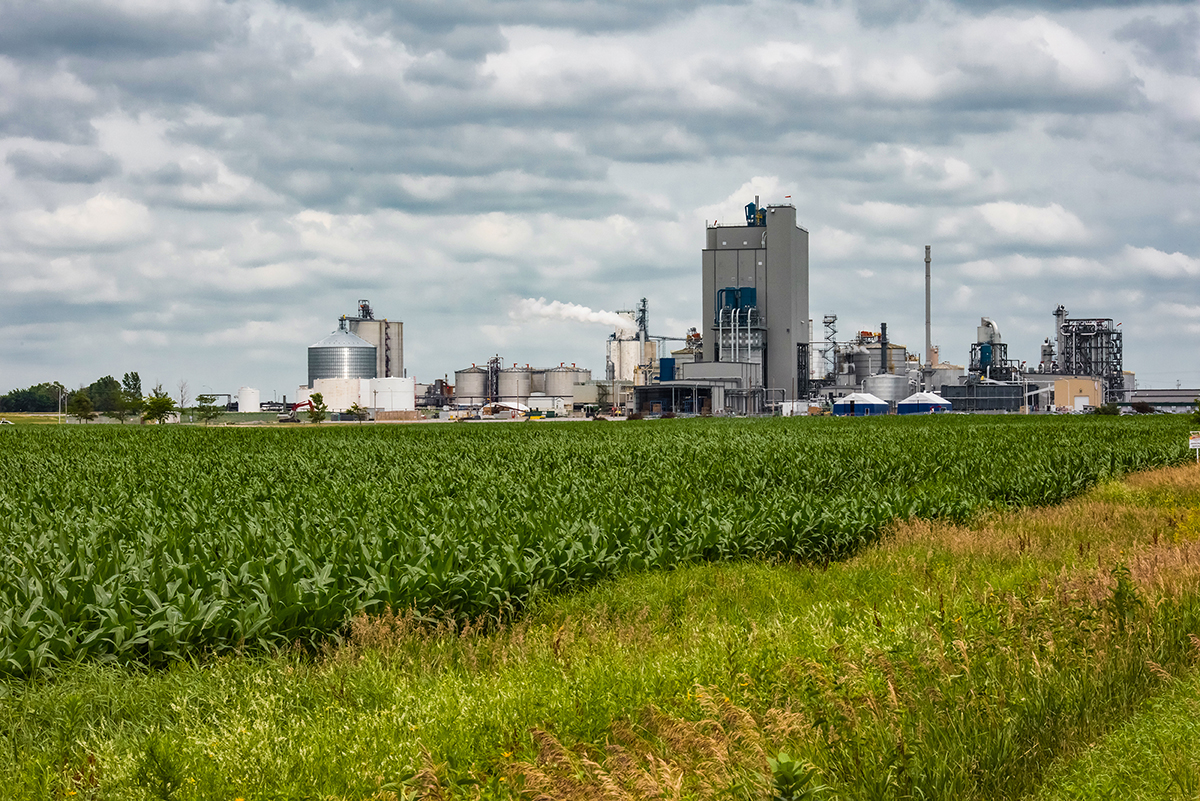
Story County, Iowa
Mergers and acquisitions have the potential to devastate communities. That’s what happened in the city of Nevada, Iowa. When Dow and DuPont merged, they closed the cellulosic ethanol plant in the city—the chemical giants did not see biofuels as part of their future. With that decision, the town lost one of its largest employers, and hundreds of lives were affected.
Enter Verbio, a successful German biofuels manufacturer looking to make its initial foray into the American market. The company decided that Iowa—the nation’s leading producer of ethanol, biodiesel and corn—would be the most advantageous location to begin its overseas operation.
Working with the City of Nevada and the Iowa Economic Development Authority, Verbio bought the $225 million facility from Dow-DuPont and then invested another $35 million to initiate plans to create the first renewable natural gas plant in Iowa. The company joins nearly every other top biofuel company in having a presence in the state.
In addition to creating at least 44 jobs paying competitive wages, Verbio will be purchasing the corn cobs and stalks necessary to make their renewable natural gas from local farmers. The “process outputs” of the plant will include renewable natural gas (RNG) and a product called humus. “Humus is a value-added lignin- and nutrient-rich soil amendment similar to peat moss or compost, which will be principally returned to feedstock suppliers and spread on farmland to replace the agronomic value of the crop residue that was harvested,” said Verbio North America President and CEO Greg Northrup. “Our process does not create any wastewater and we will not pollute ground or surface waters.”
As trade disputes and falling commodity prices affect Iowa’s agriculture industry, Verbio is providing a much-needed outlet for farmers to sell their products in a competitive marketplace. And with the capacity to produce 30 million gallons of biofuels annually, the new plant provides welcome stability to this Central Iowa farming community.
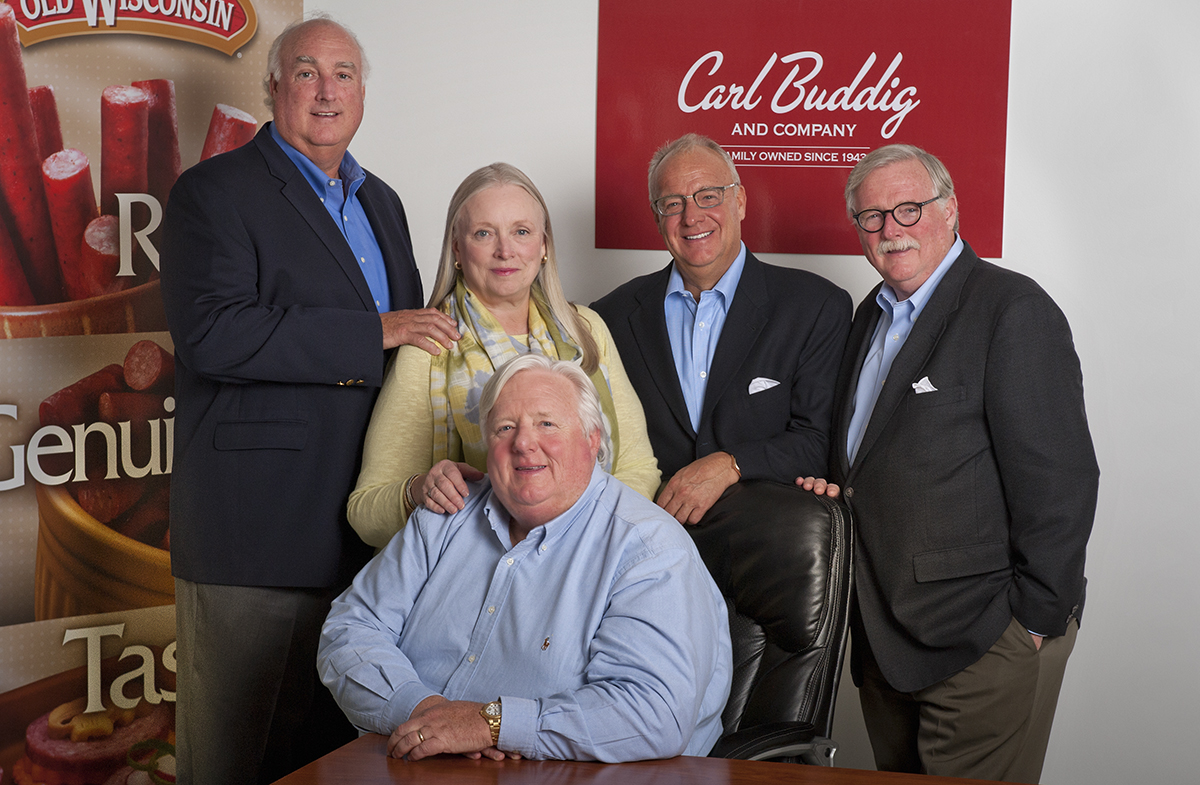
Kane and Kendall Counties, Illinois
In 2017, Carl Buddig and Co. was seeking a new manufacturing site to accommodate growing demand for its packaged meat and other food products. For Montgomery, Ill., the timing of the company’s search couldn’t have been more fortuitous.
In May of that year, Butterball announced the closure of its Montgomery bacon processing plant, which had been in continuous operation since 1972, impacting 600 full-time workers. The closure came on the heels of Caterpillar announcing that it too was closing a facility in the community, resulting in the loss of hundreds more production jobs. The community and surrounding area were reeling.
Just eight months later, in January 2018, Carl Buddig and Co. agreed to purchase the 280,000-square-foot Butterball plant and invest $30 million into it, creating 350 jobs. For the Homewood, Ill.-based company, the new site will be its fourth manufacturing plant in the state, growing its manufacturing footprint for lunch meats and specialty meats production. Coming together to help Buddig through the process was the Illinois Department of Commerce, Intersect Illinois, the Village of Montgomery, the Montgomery Economic Development Corporation and the Kane County Workforce Development Division.
Buddig’s decision to make a substantial investment in the former Butterball plant and re-employ about half of Butterball production workers was very welcome news for the distressed community. As a facility that housed a similar operation, with workers ready to be redeployed, Buddig could quickly ramp up production.
Following the purchase announcement, Buddig quickly connected to the local workforce system through engagement with the Kane County Workforce Development Division. During the site selection process, Buddig learned Kane County would be ready to coordinate a recruitment plan that would assist with the immediate hiring of 150 production workers.
As State Representative Keith Wheeler stated at the time of Buddig’s announcement, “This is a great day for the Village of Montgomery. An investment of this magnitude will offer not only relief for this resilient community, but tremendous opportunity in the years to come.”
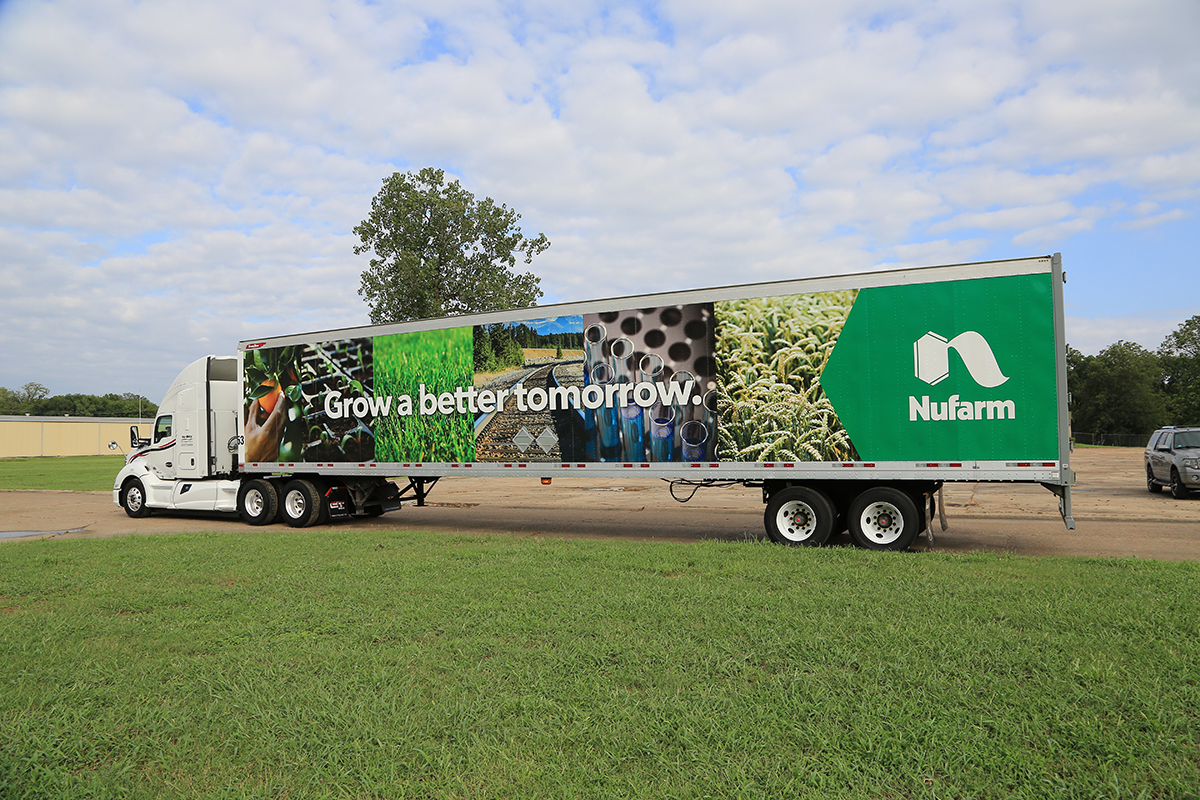
Washington County, Mississippi
Headquartered in Melbourne, Australia, Nufarm is one of the world’s leading crop protection and specialist seed companies. The firm’s products help farmers protect their crops against damage caused by weeds, pests and disease. Last August, Nufarm announced that it was locating manufacturing operations in Greenville, Miss., a $20 million investment that will create 68 jobs. The company bought the former Matcor building from the city of Greenville.
“Nufarm is an international leader in agriculture, manufacturing quality products enabling farmers to produce higher quality crops,” said Glenn McCullough Jr., executive director of the Mississippi Development Authority (MDA). “MDA, with the City of Greenville and the Washington County Economic Alliance, is proud to assist Nufarm as it locates in our state, creating dozens of new career opportunities for Mississippians in the Delta.”
The Mississippi Delta is the poorest region in the state. As of January 2019, the unemployment rate in Greenville was 7.1 percent, and Washington County’s unemployment rate stood at 8.2 percent—some of the highest rates in the state. Nufarm’s investment and the jobs created in Greenville are especially welcome, benefiting the economy and the quality of life in the region, and playing a role in building stronger communities.
“Nufarm Greenville will be a perfect complement to our other outstanding facilities, delivering safe, high-quality product for the North American market,” said Tom Lyons, vice president of supply chain and operations for Nufarm. “We appreciate the partnership created between Nufarm, the City of Greenville and the state of Mississippi, and we look forward to becoming a member of the Greenville community.”

Martin County, Florida
Hog Technologies began in 1988 as a small pressure-cleaning company, primarily servicing the residential community. The opportunity soon arose to use high-pressure water to remove road markings, and company Founder, President and CEO James P. Crocker became fascinated with the speed at which the markings were removed, with little or no damage to the road surface.
Now, decades later, Hog Technologies’ vehicles dominate 68 percent of the global market share, according to corporate research firm Bassich & Associates. Using needle-sharp waterjets traveling at supersonic speeds to restore friction to runways and obliterate rubber built up from airplane touchdown zones—and promote safety on highways by removing the white and yellow lines in work zones—Hog Technologies holds more than 20 patents related to its machinery. Through rigorous research and development, the company’s Stripe Hog pavement marking and runway rubber removal system, developed in 1997, has continued to improve in performance and now ensures safety on highways and runways in 56 countries.
Hog Technologies currently is Martin County’s largest privately held manufacturing enterprise, and one of the county’s top 10 employers. The company takes pride in its team and the culture it has built, and in their involvement in the local community. By unifying its five buildings into a single-purpose factory, the total 100,000-square-foot facility aims to maximize efficiencies across an expanded product line, adding 130 new jobs over the next three years to its current roster of 150 employees. (Hog Technologies has already hired former staff from the Lockheed Martin/Sikorsky facility in Jupiter, Fla.) With the construction of the new 65,000-square-foot world headquarters, the project, with the involvement of the City of Stuart and the Business Development Board of Martin County, will add millions of dollars in construction and taxes to the local economy.
“This is about building and growing,” said Crocker. “Enabling people to grow and build better futures for themselves and for their families—as well as reinvesting to build our community—these are the most important building projects we will celebrate.”
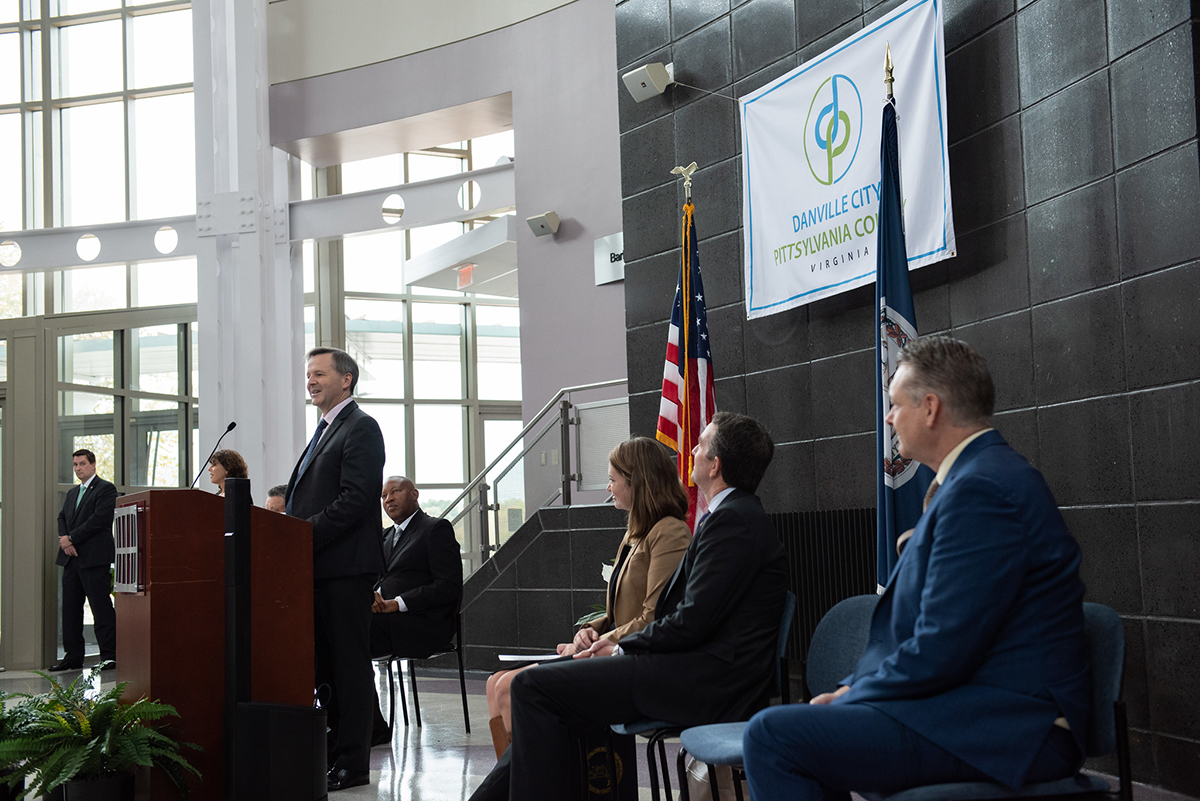
Pittsylvania County, Virginia
Founded in 1975 and based in the United Kingdom, Harlow Group offers a wide variety of services ranging from product design to the full production of engineered metal products. In November 2018, the company committed to investing $8 million to locate its first U.S. precision sheet-metal fabrication plant, called Harlow Fastech, in Danville, Va.
The City of Danville is double distressed. The poverty rate in 2015 stood at 23.5 percent, while the 2016 unemployment rate was 6 percent. Local, regional and state economic developers have worked tirelessly to revitalize the former tobacco-producing region’s economy by enhancing the infrastructure and training a ready workforce to attract manufacturers and global aerospace and automotive metal-working companies.
Harlow Group’s commitment to innovation will ensure that the region and its workforce remain prepared for the advanced manufacturing jobs of the future. The company is not only bringing a manufacturing facility, with nearly 50 new, high-quality jobs, but it will also establish a workforce Training Center of Excellence, a new facility with a focus on additive manufacturing, which will be located in Cyber Park, owned by the Danville-Pittsylvania County Regional Industrial Facility Authority. The Virginia Economic Development Partnership worked with the City of Danville, Pittsylvania County, the Southern Virginia Regional Alliance and the Virginia Tobacco Region Revitalization Commission to secure the project.
“Harlow Group’s decision to establish its first U.S. manufacturing plant and state-of-the-art training center in Southern Virginia is a major vote of confidence,” said Secretary of Commerce and Trade Brian Ball. “At the new facility in the Danville-Pittsylvania Cyber Park, the company’s production and training activities will benefit from close proximity to valuable partners such as the Institute for Advanced Learning and Technology and the Regional Center for Applied Technology and Training. There is no better place for an industry-leading manufacturer such as Harlow Group, and we look forward to the company’s future success in Virginia.”
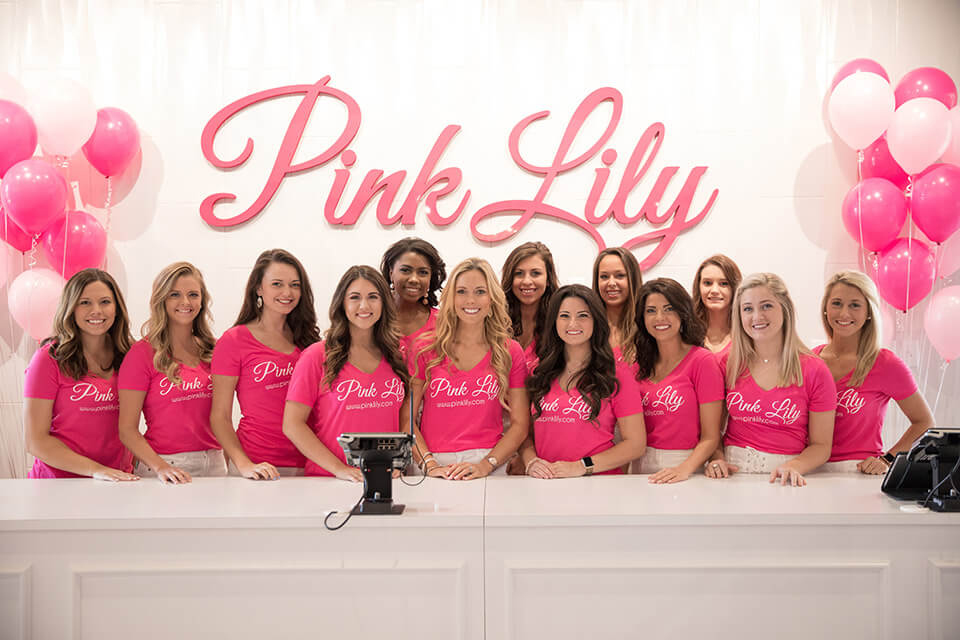
Warren County, Kentucky
Pink Lily, a local start-up, began operations as a Facebook Group in 2013, selling a limited selection of women’s boutique clothing and accessories to the Bowling Green, Ky., market. Within the first six months, company owners Tori and Chris Gerbig knew product demand was quickly outgrowing the fulfillment capacity of their living room, and PinkLily.com was born in January 2014. In the e-commerce site’s first year, sales doubled each month, growing to $4.1 million. By the end of year two, PinkLily.com grew by 300 percent.
In February 2018, The Pink Lily Boutique announced plans to double the footprint of its state-of-the-art fulfillment center in Bowling Green’s South Central Kentucky Industrial Park to more than 50,000 square feet of office and industrial space. The $2.05 million investment will create up to 56 new jobs over five years. The project involved the Bowling Green Area Chamber of Commerce, the Kentucky Cabinet for Economic Development and the City of Bowling Green.
The company could have easily moved the business to a larger city in another state that had been seeking them out, but the owners chose to stay and grow in their hometown. The Gerbigs are committed to not only the community but to their employees as well, paying an above average wage for a business of this type. The owners also provide a significant amount of time and money to local charities and not-for-profit organizations through their support of local events and programs.
“Pink Lily’s growth and success is impressive, to say the least,” said Bowling Green Mayor Bruce Wilkerson. “In just a few short years, they have grown to be a nationally-recognized success. We are glad Pink Lily has been a part of Bowling Green’s unprecedented growth in recent years and will remain an important part of the community for many years to come.”
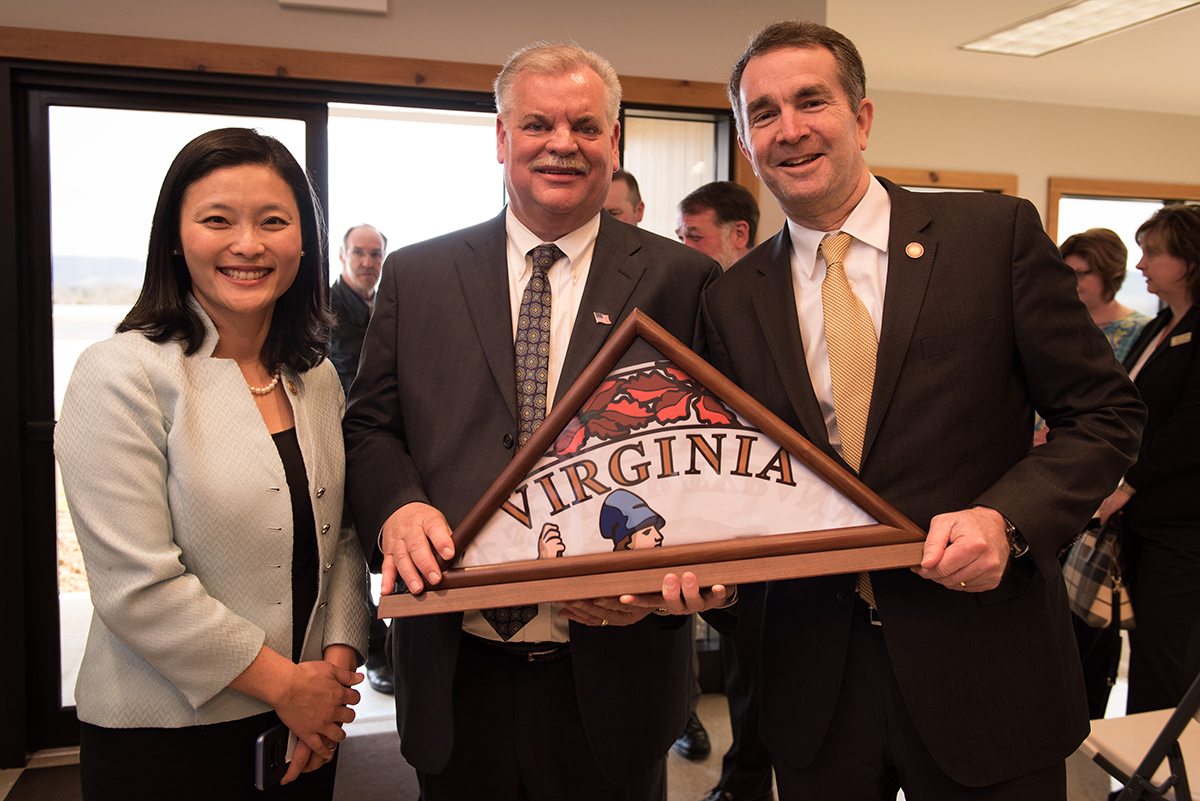
Lee County, Virginia
Founded in 1964 in Tennessee by Charles England and his sons, Eugene and Dwight, England Furniture has maintained a legacy of crafting quality upholstered furniture and employing the hardworking people of Appalachia. Today, the company continues to be recognized for the highest quality and the shortest build cycle, with products built to last a lifetime.
In March 2018, England Furniture committed to investing $1.3 million to establish a cut-and-sew manufacturing operation in Lee County, Va., at the 32,000-square-foot Lee County Industrial Building. The project will bring 79 high-quality jobs to a rural region with a highly skilled workforce and rich history of furniture manufacturing.
In addition to renovating an existing facility into productive use, England Furniture will provide a vital boost and much-needed jobs for the local distressed economy, which continues its rebound from the loss of coal-related jobs. This project represented the first announcement in Lee County in five years. The Virginia Economic Development Partnership, Lee County, the Lee County Industrial Development Authority, the Virginia Coalfield Economic Development Authority and the Virginia Tobacco Region Revitalization Commission all worked together to ensure the company chose to expand into Lee County from its home base in Tennessee.
“We are very pleased and excited to have this opportunity to work with England Furniture to provide much-needed jobs in Lee County,” said Greg Edwards, chairman of the Lee County IDA. “We are well aware of England’s current operations and success and their impact on this region. We look forward to a long relationship with the company to create a more stable economy in Lee County.”
“We are delighted to expand our operations into the great state of Virginia,” added Terry England, president of England Inc. “We look forward to operating in Lee County and becoming involved in the community.”
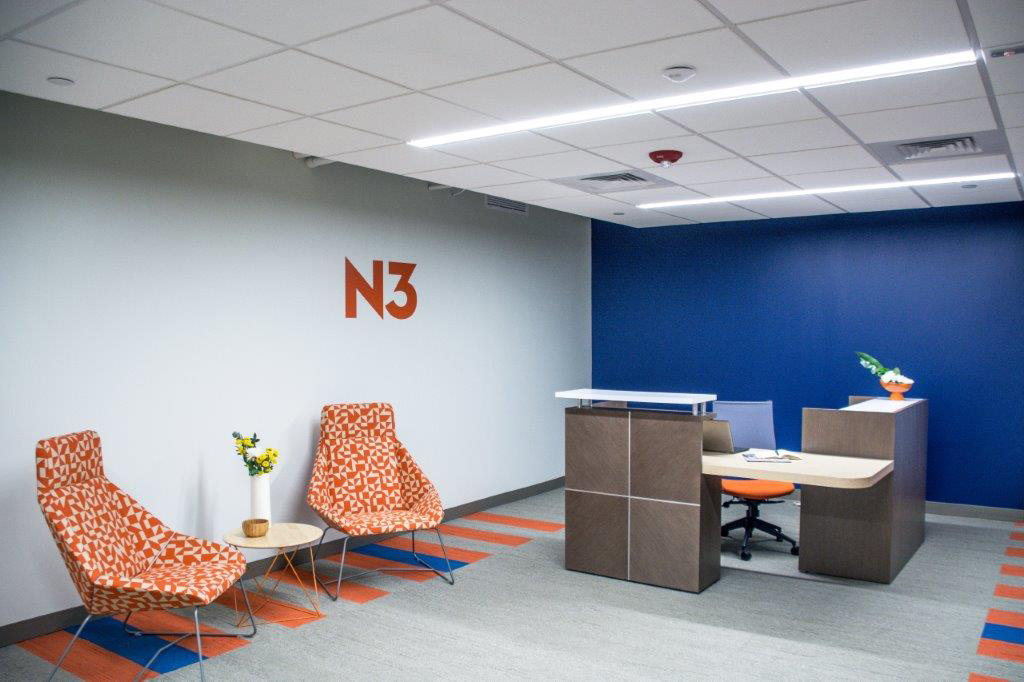
Kanawha County, West Virginia
N3 is a technology-enabled sales and marketing execution firm that opened an office in South Charleston, W.Va., in 2017. The company expanded its workforce with 100 new positions in 2018. Headquartered in Atlanta, N3 located its West Virginia office in the West Virginia Regional Technology Park in South Charleston. The company plans to expand its physical offices to span 28,000 square feet over the next several years, with the overall goal of creating 300 new jobs.
N3 works with clients across all stages in the sales cycle including opportunity seeking, nurturing, closing, enablement, utilization and expansion. Leveraging a scalable, technology-enabled sales framework, N3 accelerates adoption by converting digital interest into long-term consumption through a customer-centric, solution-based approach.
The company’s job creation comes at a much-needed time for West Virginia. While the national unemployment rate had fallen to about 3.8 percent earlier this year, West Virginia’s unemployment rate stood at 5.2 percent. “We welcome the good-paying jobs the company will create, bringing support to West Virginia families and strengthening our communities,” said Gov. Jim Justice.
N3’s contribution to West Virginia’s tech-related jobs also is helping to diversify the state’s economy. Tech jobs with good pay and benefits help the state address the “brain drain” that siphons off the young, educated population who leave in pursuit of opportunities in other regions of the country. In addition, N3 will be a valued occupant of South Charleston’s West Virginia Regional Technology Park, helping to attract even more innovation and tech occupants to the facility. T&ID
Related Agencies
- Alabama Department of Commerce
- Kentucky Cabinet for Economic Development
- Louisiana Economic Development
- JobsOhio
- Iowa Economic Development Authority
- Intersect Illinois
- Mississippi Development Authority
- Virginia's Growth Alliance
- West Virginia Development Office
- Dalton-Whitfield Joint Development Authority
- Person County Economic Development
- Nevada Economic Development Council
- Pittsylvania Economic Development
- Lee County Industrial Development Authority
- Montgomery Economic Development Corporation

